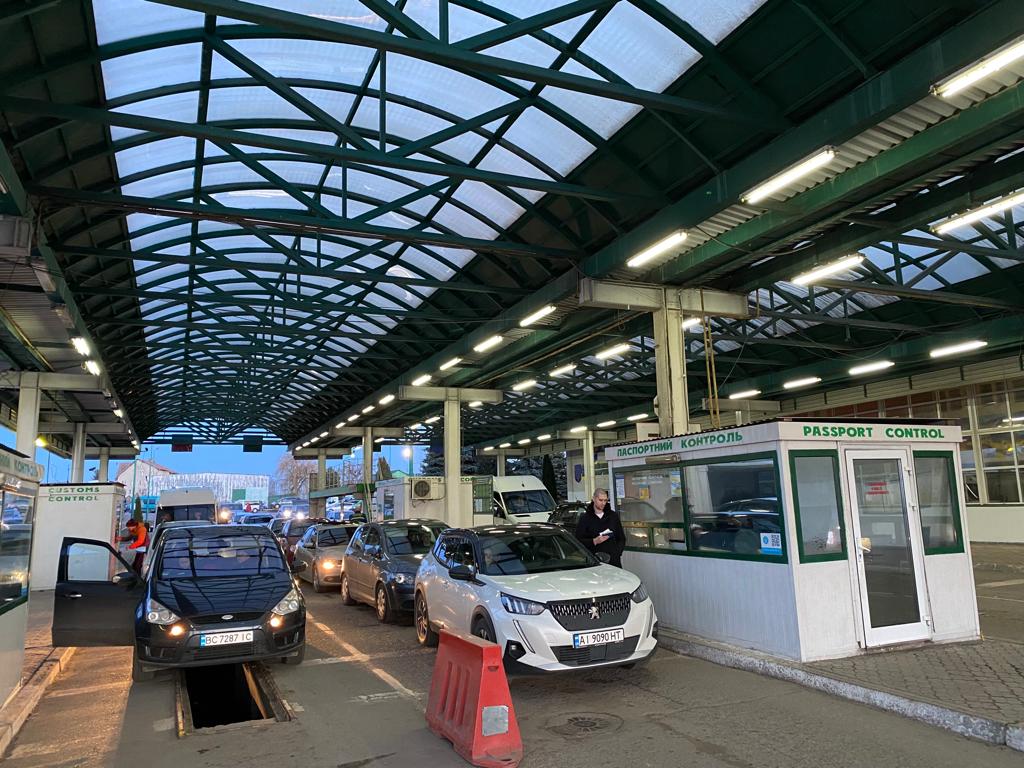Emmanuel Achiri and Hrishabh Sandilya call for immediate rectification of the current degrading and inhumane detention practices at European borders.

Refugees from Ukraine at border posts in the west of the country. (CC BY 4.0, Wikimedia Commons)
By Emmanuel Achiri and Hrishabh Sandilya
International Politics and Society

 Russia’s invasion of Ukraine has created an unprecedented humanitarian and refugee crisis in Europe, not seen since World War II, classified by the UNHCR as a level 3 emergency – the highest level available.
Russia’s invasion of Ukraine has created an unprecedented humanitarian and refugee crisis in Europe, not seen since World War II, classified by the UNHCR as a level 3 emergency – the highest level available.
Over 4 million refugees – mostly women, children, and students – have fled Ukraine over the past month. In response, Europe has opened its arms to Ukrainian refugees and the EU has announced that all Ukrainians are eligible for temporary refugee protection for up to three years, with politicians and the public showing their support. This is how the international refugee protection regime should work.
According to official Ukrainian government statistics, Ukraine had over 76,000 foreign students in 2020. About 20,000 of these were Indians and over 15,000 originated from Africa, mainly from Nigeria, Morocco and Egypt. In contrast, they have had a very different experience fleeing Ukraine.
African and Asian students have described horrid stories of being beaten with sticks by Ukrainian security, pushed off buses and trains, and neglected in favour of Ukrainians. And recent disturbing reports suggest that they are also being unfairly detained at EU borders – being denied access to protection, basic human rights, and dignity, as well as being threatened with deportation.
#Africans fleeing #Ukraine say they are up against Russian missiles & #racism on trains, in #refugee camps & via Airbnb.https://t.co/mWPkSutaor #AfricansInUkraine #RussiaUkraineConflict pic.twitter.com/ADRo3ZnYM3
— Frontline (@frontline_india) April 8, 2022
This xenophobic separation between white and non-white refugees is alarming. It has been referred to as selective-restricted access to EU refugee protection based on the politicization of the right to asylum resulting in a de facto abolishment of the right to seek protection.
The racism and double standards inherent in Europe’s response to refugee crises are obvious and glaring.
Kiril Petkov, prime minister of Bulgaria, couldn’t have been more transparent about the double standard. “These are not the refugees we are used to. … These people are Europeans. … These people are intelligent; they are educated people. … This is not the refugee wave we have been used to, people we were not sure about their identity, people with unclear pasts, who could have been even terrorists.”
“These are not the refugees we are used to… these people are Europeans,” Bulgarian Prime Minister Kiril Petkov told journalists, of the Ukrainians.
Syrian journalist Okba Mohammad says that statement “mixes racism and Islamophobia.” https://t.co/iQJHFkP9bG
— The Associated Press (@AP) February 28, 2022
Every Refugee Deserves Protection
Refugees are vulnerable. Color, race or nationality should not matter at all. Such blatant racism is not only unacceptable, but further threatens the health and lives of refugees. Fleeing the violence of war, refugees struggle to access clean water, food, shelter and quality health care.
Racial trauma only causes them more physical and mental harm. This vulnerability is worsened for students fleeing war, who are often very young, far away from their families and support networks, and may not have enough financial resources. One of the reasons why Ukraine hosts so many students from the Global South is due to the affordability of its universities.
Many African and Asian students in Ukraine have ended up leading their own rescue efforts: assisting with transportation to borders, navigating others to bunkers, and offering different types of support. Volunteers suggested this was because there was a gap in the access Black and Brown people were getting.
Some African and Asian countries took steps to ensure their nationals could enter EU member states and organized transport home but many thousands had to deal with the situation themselves. While data on the number of African and Asian students still stuck in Ukraine is scarce, reports about students requesting evacuation and green corridors continue to emerge. Clearly, there are foreign students who have been unable to make it out so far, and some may have lost their lives too.
2 million people fled Ukraine in two weeks — Europe's largest refugee crisis since WWII, says the UN.
They include 100K non-Ukrainians, many of them African, Indian and Arab students.
The EU granted Ukrainians temporary protection, but that does not apply to foreign students. pic.twitter.com/akHWKJD42E
— AJ+ (@ajplus) March 8, 2022
What does the future for the African and Asian students who were at Ukrainian universities look like? First, for those who wish to stay in Europe or cannot be repatriated back to their home countries, what comes next as they seek to rebuild their lives, study further and apply for asylum themselves? And second, for those who have indeed returned home, how can they reintegrate into their societies and perhaps more importantly, restart their education and/or switch to professional careers?
Students’ Future
For those who wish to stay in Europe, the EU’s temporary protection directive will not uniformly apply to students who did not have permanent residency in Ukraine before the war, and instead they must apply for asylum at a national level if they seek protection. It is yet unclear if member states will grant asylum this way. And if past refugee waves have told us anything, it is that Africans and Asians are at a significant disadvantage.
In response to widespread criticism, another route is emerging in which students could possibly transfer their studies to another European country. So far, France has suggested that some Africans studying in Ukraine may continue their studies at French universities. This project, driven by the Presidential Council for Africa (CPA), would allow Africans fluent in French find a university offering the same curriculum to enroll in France. Hungary has also announced that some Ghanian students will be allowed to finish their studies at its universities but it is still unclear which students are eligible.
While one hopes that other EU members follow suit, the racist response of countries like Estonia, which is making special exemptions for Ukrainian students to enter universities in the middle of the year, but not foreign students who were in Ukraine, is a reality check. It would thus be prudent for student refugees to ally with European student organizations and lobby for politicians to do more.
[Thread] The most racist Ukraine coverage on TV News.
1. The BBC – “It’s very emotional for me because I see European people with blue eyes and blonde hair being killed” – Ukraine’s Deputy Chief Prosecutor, David Sakvarelidze pic.twitter.com/m0LB0m00Wg
— Alan MacLeod (@AlanRMacLeod) February 27, 2022
For the large number of those who have returned home, the question about their educational and professional future now arises. For many, the main concern is how to finish their education – especially for those close to completion.
In Nigeria, the fear is that students who have returned to the country will be unable to acquire the requisite visas and financial means to study elsewhere in Europe. Others have expressed doubts about the quality of education in Nigeria and hope to return to Ukraine or migrate elsewhere, despite private Nigerian universities waking up to the opportunity that these returning students may present.
In India, most students who have returned from Ukraine are studying medicine. While the Indian Medical Association has recommended they be allowed to join programs in India to finish up, doubts remain over whether this is feasible for all of them given the intense domestic competition and limited seats available for medical studies. Other issues, including lateral transfers of credits and the need for rehabilitation have also been raised, with no clear path forward emerging – as yet.
The situation is marginally better in South Africa, following consultations between students and university representatives. Despite the difficulties this might pose, some universities have begun drawing up proposals to integrate fifth- and sixth-year medical students. On the other hand, Cameroonian authorities have been largely silent on the futures of returning Cameroonian students, whilst calling for peace and dialogue between Russia and Ukraine.
Europe Must Do More
Clearly, there are more questions than answers at this stage. And while Europe’s current focus is on the humanitarian situation on its borders with Ukraine, this focus will inevitably shift to matters of integration. Hopefully, innocent foreign students are not bogged down in EU member states’ notoriously slow decision-making processes and policy-makers and universities can rise to the occasion instead.
While France and Hungary’s approach is a start, there is still the need for a concerted effort to ensure that these students are able to continue their studies without losing years of effort, learning and tuition fees. These students, many of whom will probably seek asylum in the coming months, need to be provided not only with international protection, but also academic opportunities.
Thus, EU member states should recognize the vulnerability of student refugees and embrace and offer them the opportunity to transfer to European universities, in circumstances devoid of the rigid and racially motivated rules which prioritize some refugees as more deserving than others.
The current degrading and inhumane detention practices of African and Asian student refugees at European borders need immediate rectification. European leaders must live up to their commitments on international protection guaranteeing them to all, irrespective of race, color, nationality, or ethnic origin by offering humanitarian assistance to these student refugees.
Similarly, African and Asian governments must begin much-needed discussions with local universities, professional bodies, and student associations to ensure that those who have returned home are equally able to continue their studies – and rebuild their academic and professional lives.
Emmanuel Achiri is a Ph.D. candidate at the Eastern Mediterranean University, the co-founder of VOIS Cyprus – a representative body for international students, and co-Founder of Stop the War in Cameroon Coalition – an initiative conducting peace research on Cameroon. His research work focuses on migration and refugees, international law, crises in the Lake Chad Basin region and EU-Africa relations.
Hrishabh Sandilya is the co-founder and head of Project Phoenix in Cyprus.
This article is from International Politics and Society.
The views expressed are solely those of the author and may or may not reflect those of Consortium News.

The racism in Eastern Europe is a glaring problem. However, is Russia any better than its neighboring countries in accepting refugees of all color? Why would we expect them to behave any differently?
Human rights have always depended on the colour of your skin.
What did you expect from a Nazi regime?
There are, as yet, no regimes in Europe that could accurately be described as ‘Nazi’. Ukraine’s government is no liberal democracy and the evidence shows how it gives approval to violent fascists such as the Azov Battalion, C14 etc. But it is not itself a Nazi government, and neither is any of the governments of states bordering Ukraine, right-wing and inhumane as they clearly are.
“There are, as yet, no regimes in Europe that could accurately be described as ‘Nazi’.”
The ruling PiS party in Poland can be fairly accurately described as Rexist. Close enough for you?
The west has called the white Russian people sub- human, so what do you think they call coloured people? It is ridiculous for so many students to be in that racist country. Poland is just the same as so many other European countries.
Russia takes in many African students and so does China. It may be that they only can take in so much, but what about Cuba or south America?
Why save and spend hard earned savings in racist countries? Cuba has excellent medical training,and their doctors are all over the third world. The flight might be more expensive, but you save in fees, food and lodging. You face no discrimination!
The west needs foreign students to help fund their universities,and at the same time brainwash you, with electives to do exactly that. Some go home and perpetuate colonialism and imperialism, and hamper the rise of their countries.
Don’t go to those hateful places,and tell your people what happens to them in these lands. That will go far in banishing this evil.
Whilst Cuba has many attractive attributes such as its socialist systems, there is still plenty of anti-Black racism there, as the government is very aware.
“”There’s something that is a burden, it’s very subtle, but it’s a prejudice that keeps going,” said painter Salvador Gonzalez, 71, who exhibits his work in El Callejon de Hamel, a bastion of African heritage in the capital Havana.
Black activist Alexander Holl, 22, says skin color has a “huge influence” on relationships in Cuba. “It’s common for white families to tell (their daughters) not to get involved with that (black) lad,” said the history student. “When you want to be with a white girl, sometimes you realize this is an impediment.”
Recognizing the magnitude of the problem, President Miguel Diaz-Canel announced in November a program to “definitively eliminate the vestiges of racism.”
In Cuba, 9.3 percent of the 11.2 million population identify as black, 26.6 percent say they’re mixed race, while 64.1 percent claim to be white, according to a 2012 census.
Manuel Cuesta, 57, an Afro-Cuban government opponent, says “there are the vestiges and remnants of symbolically cordial racism, structurally hidden, installed in the economic, institutional and political dynamics” of the country. In 2003, Castro admitted there was underlying racism “associated with poverty and a historic monopoly on knowledge” in various fields by whites.
In parliament, 40.5 percent of deputies are black or mixed race, including the president Esteban Lazo. But Holl says no-one should fall into the trap of “counting the number of blacks and mixed race people in parliament or the government to demonstrate that racism doesn’t exist. “The true racism is in the streets, in the feeble structural and economic conditions of the black and mixed race population. You guaranteeing me a right by law doesn’t mean that I have all the economic and social conditions to validate that right.””
[France24]
People can go around the entire world finding places with racism, for in the human DNA, all types have bias, prejudices . But is only in certain places that it results in people getting attacked and killed in the streets.
In “god-bless” USA,the crimes against Asians went up by 600%, by your own news. A lesser increase is in Canada, Australia and no doubt Europe.
Weekly, America kills their own black people for fun. Over here in Canada “carding” against black people is the norm.
Now it is Russian people’s turn: Do not equate Cuba with USA or “white freedoms”, as is so often portrayed. What should happen is we get beaten and killed in the global south, the same way we treat them.